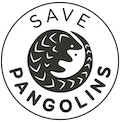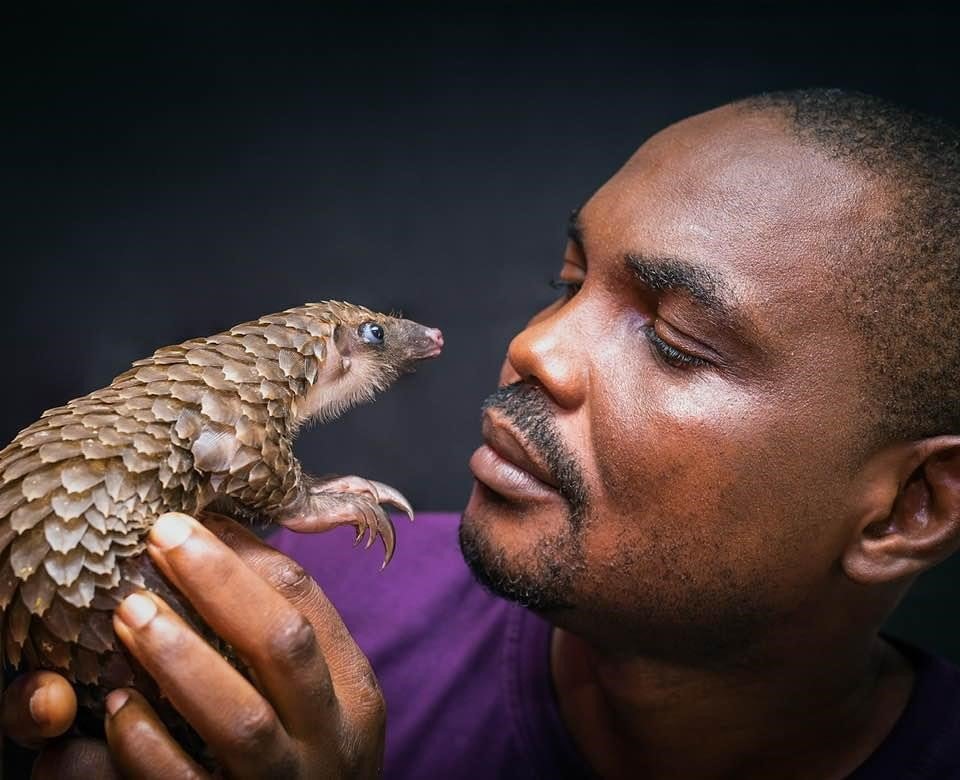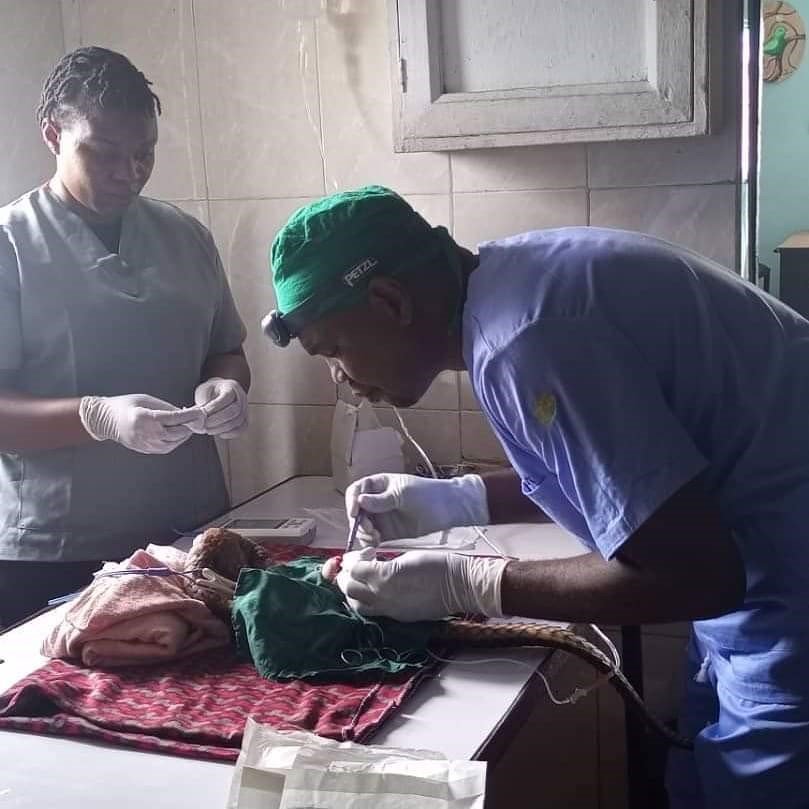In celebration of World Pangolin Day we bring you the second part to our conversations with the Pangolin Champions. Our friends from the Emerging Wildlife Conservation Leaders (EWCL) spoke with the Champions to hear their stories from the field. Click here for Part 1.
Today we’re sharing another conversation between EWCL team members and two of our Champions working in Africa to protect pangolins: Dr. Mark Ofua, who works with Saint Mark’s Animal Hospital in Nigeria to rescue, rehabilitate, and release pangolins to protected forests; and Carla Mousset who has been working in Gabon to inspire leadership in pangolin conservation by engaging people and communities in the creation of a Gabon Pangolin Working Group.
EWCL Team: Why do you work with pangolins?
Dr. Mark: I have this saying “once you look into the eyes of a real life pangolin, you feel compelled to do something to help”. It is like you get drawn in, you feel this silent but strong appeal from this wonderful animal to help its species. I basically help all animals but since I crossed paths with the pangolin, I have been invariably drawn in more and more to help them. The fact that they are endangered only makes this need to help more urgent!
Mark Ofua in Nigeria with a rescued pangolin pup named Neal.
Carla: For almost a decade, pangolins have been considered the most poached mammal in the world. They are vulnerable animals whose defense techniques are ineffective against the humans who are currently contributing strongly to the decline of pangolin populations in the wild. As a human aware of this problem, my goal is to reverse the trend and contribute to stopping this decline.
EWCL Team: Why should people care about pangolins?
Carla: All species contribute to the stability of the global ecosystem that is the earth, each with a role to play. Pangolins are currently poorly studied animals, especially in terms of their ecology. Among the known ecological roles of pangolins, there is the regulation of the populations of ants and termites which are insects whose proliferation would have a negative impact on forest resources such as wood. Pangolins also aerate the soil when they turn over the ground in search of ants and termites, which contributes to its fertilization.
Carla Mousset helped create the Gabon Pangolin Working Group to inspire leadership in pangolin conservation.
Dr. Mark: Pangolins matter because life matters. All life matters. They are a keystone species, and other life forms depend on them, including us. If we let them disappear from their niche, we will all be negatively affected. We are interdependent, and the more we let them disappear the tougher things will be for us! We must work together to save our pangolins in order to save other life forms and in order to ultimately save humanity.
EWCL Team: Tell us about a typical day at work.
Dr. Mark: We focus on rescuing, rehabilitating and releasing pangolins to protected forests. There is a paucity of information on these species, so we are working to generate data to help us and other conservationists help pangolins. So many things are yet to be understood about them that makes the work hard. They eat exclusively ants and termites and this makes captive care very difficult. They are very fragile and very sensitive, so caring for them can be intensive.
Caring for our five hand-raised pangolin orphans takes at least eight hours daily to feed and exercise them. In between, we do community education via our Conservation Club on the need to conserve pangolins and work with the government to enforce laws and to work on new laws. And on the side, we work with the media to create awareness for the need to save the pangolins.
Mark performing surgery on a wounded pangolin rescued from the illegal trade in Nigeria.
Carla: I am currently training students from the National School of Water and Forests through internships within the Gabon Pangolin Working Group and taking advantage of the many meetings I currently have to sensitize authorities and institutional staff on the problems faced by pangolins. I also conduct DNA analysis of scales from seized pangolins to determine the pangolin species or geographic origin.
EWCL Team: This week as we celebrate World Pangolin Day, is there anything you would like to share with readers - how can they help you?
Carla: Learn about the problems around pangolins and do something about it. Talk about it and adopt responsible behavior: stop consuming [pangolin products], contribute to awareness, and conduct studies on pangolins.
Whether analyzing samples in her lab, or out speaking with community members, Carla is dedicated to protecting pangolins in Gabon.
Dr. Mark: You can help by being deliberate about learning about the plight of pangolins. The more you know, the more you will realize the need to help. You can support local and international conservation efforts and share their messages on all media. Tell your friends and family about pangolins and join in the stand to say ‘NO’ to illegal bushmeat and poaching. Encourage governments to help better protect these creatures and help spread the word on the need to save pangolins.
You can also help Pangolin Champions like Carla and Dr. Mark and support other critical work to protect pangolins by donating today.
Tune into this week’s podcast hosted by Forces For Nature to hear more from Carla and Dr. Mark, and learn more about their work at www.institutfrancais-gabon.com and www.saintmarkvet.com.ng.
Read the conversations with two other Pangolin Champions, Elisa and Kumar, here.
























